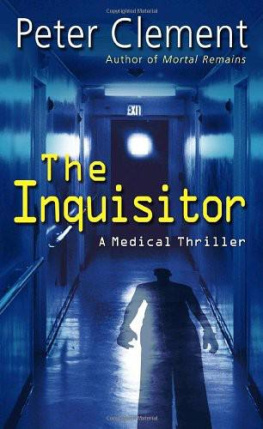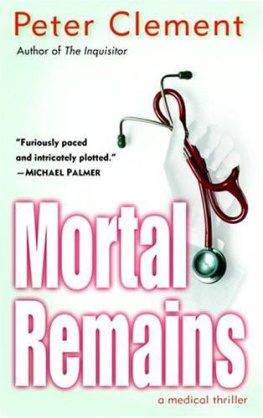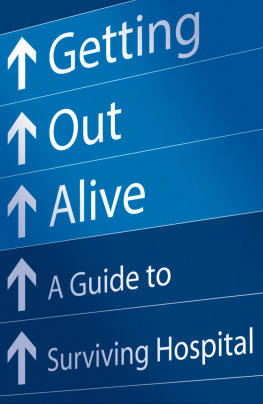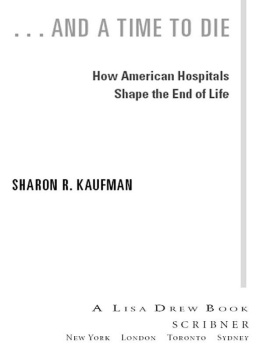BLURB from Amazon :
Severalpatients die each day at St. Paul's Hospital, a sprawling complex in Buffalo,N.Y., that takes on the most high-risk cases, including victims of the SARSvirus. A few more deaths a week would hardly even be noticed. But hospitalvice-president Dr. Earl Garnet, star of Clement's enjoyable line of medicalthrillers, perks up when he hears about a strange circumstance in thehospital's cancer wing: a few days before they died, many of the patientsreported out-of-body near-death experiences. Someone, Garnet determines, hasbeen taking cancer patients to the brink of death and tape-recording theirobservations before briefly bringing them back to life. Suspects include thehospital's chaplain, Jimmy Fitzpatrick, who has been lobbying for years to getSt. Paul's to relax its policy on withholding pain medication to terminalpatients; Monica Yablonsky, the head nurse on the cancer ward whose prickly,unhelpful demeanor makes Garnet wary; and Dr. Steward Deloram, St. Paul'scritical care expert who has also done extensive research into near-deathexperiences. The action in Clement's sixth hospital-based thriller (MortalRemains, etc.) moves briskly and without an overload of medical jargon. Despiteseveral indistinguishable characters and a few dead-end plot linesClement doeslittle with the SARS element after an initial buildupthis entry keeps theauthor on an ascending trajectory in thegenre.
The Inquisitor
By Peter Clement
Chapter 1
Wednesday, April 2, 5:30a.m. Palliative Care Unit, St. Paul's Hospital, Buffalo, New York
The air on the ward hungthick with the smell of flatulence, body odor, and sweat-soaked sheets. Whatlittle light could be seen curdled in pools of shadow. The cries that rose andfell against the outside of her door might as well have been a wail of wind,because here no one would heed them. The nurses paid attention only when themoaning stopped.
Somewhere someone retchedwith a force that must have stripped the stomach bare. The sound echoed alongthe hallway.
That might bring them.
Soon the squeak of crepesoles on linoleum would announce their approach.
None came.
"Store up all the tinydetails. Let me smell, taste, hear, see, and touch through your telling of them." The command, issued to me so long ago, resurfaced, resonating in memory with thefreshness of an order spoken on the spot and not to be disobeyed. As alwaysbefore a mission, it marshaled a frame of mind fine-tuned to observe, the idealstate to be in for keeping myself and the records sharp.
"Can you hear me?"I whispered, holding back on the plunger of my syringe.
"Yes." Her eyesremained shut.
I leaned over and brought myear to her mouth. "Any more pain?"
"No. It's gone."
"Do you seeanything?"
"Only blackness."Her whispers rasped against the back of her throat.
"Look harder! Now tellme what's there." I swallowed to keep from gagging. Her breath stank.
"You're not mydoctor."
"No, I'm replacing himtonight."
She didn't respond.
I gave her a gentle shake."Mrs. Algreave?"
"Just leave me be. Itdoesn't hurt anymore."
Leaning back, I studied hergray, skeletal face. The moonlight cast a silvery blue tinge over her pallidskin, making her appear already dead. As for the rest of her, so much hadwasted away that the soft material of her lace nightgown clung to the hollowsbetween her ribs and reminded me of white gloves on bony fingers.
I glanced toward the closeddoor the nurses shouldn't start their rounds for another half hour yet andreapplied my thumb to the plunger. A slow push, and her pulse grew weaker."Do you see anything yet?"
No answer.
"Mrs. Algreave!"
"Yes?"
"Tell me what yousee."
"It's too dark."
"Look carefully."
"But I can't see."
"Do you sense yourselfrising?"
Again no answer.
I shifted my mouth closer toher ear. "Talk to me, Mrs. Algreave." The words must have soundedlike a shout.
"Leave me alone."
"Not until you tell mewhat you see." I gradually increased the pressure on the plunger. Herpulse diminished to clusters of barely discernible bumps, readable only toexperienced fingertips, like Braille. It shouldn't be long now. Her failingcirculation would abandon the lesser organs kidneys, ovaries, digestivetracts, large and small and reroute itself entirely to spare the more essentialmeats, the lungs, heart, and brain. A perfectly orchestrated sequence, designedto save neurons so that they could record the final seconds. Anyone bold enoughcould tap the knowledge hidden in those moments. "Are you looking down onus yet?"
At first I thought shehadn't heard me. Then her lips moved but emitted no sound. Turning my head, Ihovered an inch above her mouth. She exhaled against my cheek, sending anotherwhiff of rot drifting through my nostrils to play at the back of my tongue. "Whatdid you say?"
"I... see... me ..."
Her words filled my ear onebreath at a time, elongated and no louder than a puff of breeze. But I couldjust make them out, having become a practiced listener to messages from thisplane. Excitement mounting, I turned on the tiny tape recorder in my breastpocket. "What else can you make out?"
"The... bed...nightstand... pictures ... all my pictures..."
On the small bedside table asilver-framed black-and-white shot of a young man in uniform stood proppedbehind an array of more recent, color snaps, the kind processed in an hour: adark-haired couple, three grinning boys in front of a Christmas tree, a womanholding a baby. Only the soldier interested me. "Is that yourhusband?"
"Yes..."
"What's his name?"
I barely made out the wordthat followed. It sounded like "Frank."
"Is he dead?"
Her breath diminished to apoint it wouldn't have fogged a mirror. "Yes..."
"Do you want to findhim?" Most did. The yearning to meet up again never died.
"Yes ..."
"Are you still lookingdown on yourself in bed?"
"Yes..."
"Let go. Allow yourselfto float, escape the hospital, go high above the building. You must do thisbefore you can see Frank."
"Yes..."
"Look up."
"No..."
"Look up and you'll seeFrank. He's waiting."
"I... won't...get... back...."
"Look up!"
No reply. Had I forced hertoo far? No, she still had a pulse. Nevertheless, I eased off the plunger."Can you hear me?"
"Yes..."
"What do you see?"
"Too... vast ..."
"What? Night? Space?Stars?"
"Gray..."
"Gray what?"
"Cold..."
"Tell me what'sthere."
"Nothing..."
My insides tightened."You've got to see something."
"It's horrible ..."
"What is?"
"Help me...."
Damn her, why didn't shetell me? "Describe where you are, or I'll leave you there. Frank won'tever find you."
This time I heard a sharpintake of breath. "No... please..."
"Then tell me."
"Nothing... to...tell ..."
The pulse under my fingersraced stronger. Her breath blew against my ear with more force.
"It's... terrible.... Get... me... out.... Please... get me out...."
The faint sounds became acry. Her eyes shot open, wide with terror.
No one had ever come tobefore now.
I clamped my palm over hermouth and watched the door again. Had one of the nurses heard?
No footsteps approached.
She looked straight at me.
"You recognize menow?" I asked, my thumb still on the plunger.
She nodded and tried to saysomething, but the sound vibrated against my palm. It tickled.
"Shh! Don'tspeak!" I advanced the plunger. Just give her a little more, enough tosubdue her again. "You've been having a bad dream."
She shook her head and fixedher stare on where I'd stuck the syringe through a rubber portal in her IV. Herbrows shot upward and her forehead furrowed with alarm, and the squeals shemade against my hand pierced the quiet. I pressed down harder. "I saidquiet!"
Next page






